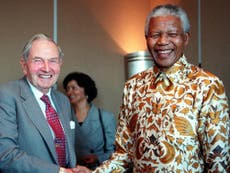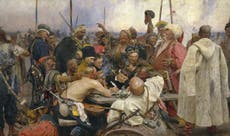Mea Culpa: a grizzly confusion – old and grey
Misspellings lead to myriad mishaps in this week’s Independent


A common spelling mix-up confused our commentary on the battle for Mosul in Iraq. We wrote of “the grizzly tradition of trying to explain away heavy civilian loss of life caused by aerial and artillery bombardment of cities”. That was changed to “grisly”, meaning horrifying or disgusting, from Old English grislic, “terrifying”.
Spelled with two zs, “grizzly”, from French gris, grey, means mixed dark and white hair or fur, hence the bear. It is possible that we were influenced by “grizzled”, which can be a way of saying old or venerable, and we were trying to say “ancient and reprehensible”. But the word “tradition” takes care of the idea that this is something that has been going on for a long time.
There is also, incidentally, another meaning of grizzly, to describe a child crying fretfully, which comes from the same root as “grin” or “gurn”, meaning to show the teeth. That is definitely not what we meant.
Sowing more confusion: Another spelling mistake affected a comment article about the Brexit negotiations, saying that they were bound to be difficult, but that if the public mood changed, “it may sew an even more toxic political seed further down the line”. There is no good reason why “sew” and “sow” should be spelled differently. They are from different Old English words, siwan and sawan, both of Germanic origin, which were pronounced differently. It has been changed to “sow”.
Ten thousand problems: I quite like “myriad”, which comes from the Greek for 10,000, and is a more interesting way of saying “many” or “a lot”. Mick O’Hare has emailed to point out that we are not consistent in the way we use it. In two articles about health we wrote of “the myriad of symptoms” and of struggling with “myriad physical issues”. I agree with Mr O’Hare that it is more elegant without the “of”, but I am more bothered by the use of “issues” to mean “problems”, which I think is weak and euphemistic.
So-called ‘made-up’ words: We often go for the belt-and-braces approach to unfamiliar phrases. In our report of Vladimir Putin suspending the agreement between the US and Russia designed to stop their forces coming into direct conflict with each other in Syria, we referred to “the so-called ‘deconfliction line’ between the US and Russia”. The deconfliction line should either be “so-called” or it should be in quotation marks, but not both. Although, on reflection, so-called “deconfliction” is such a terrible word that perhaps we are right to doubly distance ourselves from it in this way.



Join our commenting forum
Join thought-provoking conversations, follow other Independent readers and see their replies